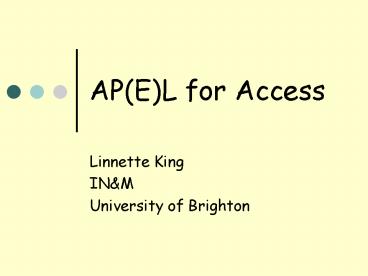APEL for Access - PowerPoint PPT Presentation
1 / 17
Title:
APEL for Access
Description:
To share and explore successes and challenges in using Accreditation of Prior ... Use of Carper's ways of knowing' Reading and sources. Brown, R.A. 1995. ... – PowerPoint PPT presentation
Number of Views:47
Avg rating:3.0/5.0
Title: APEL for Access
1
AP(E)L for Access
- Linnette King
- INM
- University of Brighton
2
Aim of session
- To share and explore successes and challenges in
using Accreditation of Prior and Experiential
Learning (AP(E)L) for access in further and
higher education
3
Proposed content for session
- Explore experiences and understanding of AP(E)L
- How? What? And Why?
- Portfolio evidence and development
- Use of reflective writing for evidence
4
Aim of AP(E)L
- AP(E)L aims to avoid repetitious learning and may
reduce the taught content and, or assignment
workload of the programme of study entered
5
APL
- Accreditation of Prior Learning (APL) relates to
the Credit Accumulation and Transfer System
(CATS), which enables students to transfer
credits gained from one institution to another.
The credit should be matched to the learning
outcomes of units of learning within the
transferred programme
6
APEL
- Accreditation of Prior and Experiential Learning
(APEL) enables students to gain credit for
relevant prior learning in the workplace. This
should be matched against their current programme
of study, or is considered to be relevant towards
it. - A reflective account of the learning experience
is usually required
7
Types of Credit
- General credit
- Is awarded for activities which are recognised as
being of academic level - Relates generally to a course
- Is an academic judgement expressed in credits
- Specific credit
- Is that awarded towards a specific programme of
study - Is seen as specifically relevant to count towards
a course and the award - needs to match the learning outcomes of units
within the selected programme
8
Levels of Learning
- Academic levels that equate to the expected
achievements of programme of study, e.g. 3 year
graduate course - 120 level one credits certificate
- 120 level two credits diploma
- 120 level three credits degree
- 180 level M credits masters degree
9
FE/HE - relationship
10
Aim of APL Process
- To transfer credit from another institution by
gathering evidence of aims and learning outcomes,
course work, assessment feedback comments,
transcripts, certificates - If a unit of learning was completed over five
years ago then evidence of currency is required
11
Aim of APEL process
- To identify past significant experiences and
reflect on this to identify knowledge and skills - To express significant learning concisely
- Use a conceptual framework for analysis
- Demonstrate application to practice
- Synthesise the evidence to support claim
- Consider evidence for authentication
12
Steps in AP(E)L Process
- Identify and register on a programme
- Attend an AP(E)L workshop
- Plan time for accumulation of evidence and
tutorial support - Compile portfolio of evidence (proforma)
- Submit completed portfolio
- Assessed and moderated internally
- Sample selection scrutinised by external
- Credit is validated at exam board
13
Purpose of AP(E)L Portfolio
- To record significant learning experiences and
achievements - To collate these prior experiences and learning
into a medium for assessment - To enable a continuing professional development
process - To express self-development in a personal and
dynamic way
14
Essential Criteria for Assessment
- Authenticity
- Directness
- Breadth
- Quality
- Currency
- GEAR - University of Brighton
15
Reflective writing for APEL
- This can actively transform knowledge, rather
than a simple reiteration - Leads onto questioning and reflection on what is
known - Enables theorising about experiences
- Can apply theory to practical situations, and, or
solve practical problems
16
Reflective Frameworks
- Gibbs Reflective Cycle
- Johns Model of Structured Reflection
- Use of Carpers ways of knowing
17
Reading and sources
- Brown, R.A. 1995. Portfolio development and
profiling for nurses. 2nd edition Mark Allen - Moon, J. 1999. Reflection in Learning and
Professional Development. Kogan Page - Nganasurian, W. 1999. Accreditation of Prior
Learning for Nurses and Midwives. Mark Allen - Nytanga, L. et al. 1998. Good Practice in the
Accreditation of Prior Learning. Cassel - Wailey, T. 2002. How to do AP(E)L. SEEC































